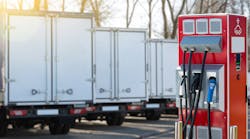Fueling future fleets is just another problem trucking can solve
I saw two news items within two weeks of each other that focused on infrastructure.
Speaking before the unveiling of his company’s SuperTruck II project, Daimler Truck North America’s president and CEO John O’Leary, said, “Overwhelmingly, infrastructure is slowing us down in terms of EV deployment.” That event was at the end of January.
In mid-February, there was news of BP Products North America acquiring TravelCenters of America. Bernard Looney, BP CEO, said the acquisition will enable “growth in EV charging, biofuels and RNG, and later hydrogen.”
It almost seems like BP was listening to O’Leary’s concerns. Let me be clear, O’Leary was not the first person in the trucking industry to comment on the fact that the infrastructure is making fleets cautious about investing in EVs. We have known that a lack of infrastructure has been a major concern for many fleets, but it is good when someone in O’Leary’s position makes it part of public remarks.
See also: Feds help fund freight decarbonization projects from coast to coast
And BP is not the first company to highlight the infrastructure issue and offer a solid plan for addressing it. In mid-January, Shell USA announced it had signed an agreement to acquire Volta’s charging network. In the past 12 to 18 months, there have been other announcements of companies coming together to address the charging challenge and/or to work on charger standards.
The charging infrastructure issue is complex, and the more great minds working on it, the better. There is a great deal to consider when it comes to charging, including what kind of chargers are needed, the best locations for those chargers, layout of the site with the chargers to allow easy ingress and egress, impact on the grid, etc.
But EVs are not the only vehicles we have to worry about fueling, especially because, at this point, EVs are not right for every use case. As we wade through to our zero-emission freight future, we have to look at infrastructure for compressed natural gas, as well as hydrogen and other renewables. A network of existing truck stops/travel centers is a great starting point for meeting the fueling needs for our multi-fuel, near-term transportation future.
I have confidence we will solve the “fueling” issue for all these powertrain options fleets will be choosing from because we already have so many companies working collaboratively on the problem. History has shown us that when the trucking industry works together, we make things happen. The fueling issue of the next few decades is just one in a long line of problems we will solve.
Michael Roeth has worked in the commercial vehicle industry for nearly 30 years, most recently as executive director of the North American Council for Freight Efficiency (NACFE). He serves on the second National Academy of Sciences Committee on Technologies and Approaches for Reducing the Fuel Consumption of Medium and Heavy-Duty Vehicles and has held various positions in engineering, quality, sales, and plant management with Navistar and Behr/Cummins.




